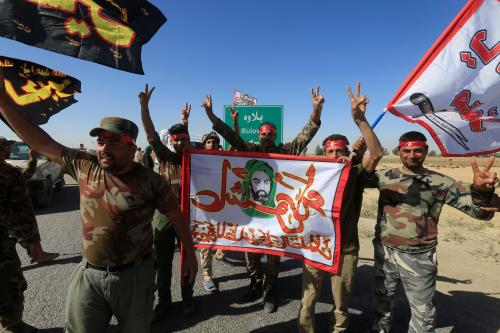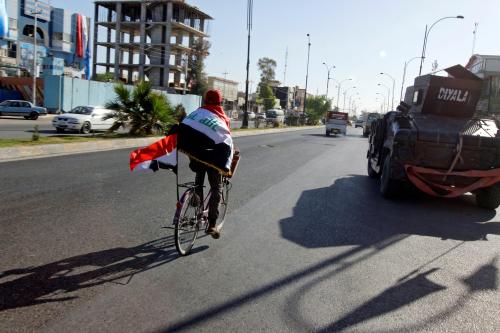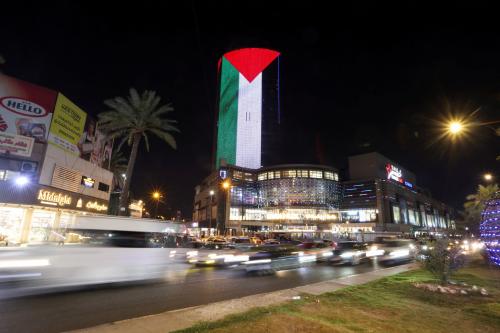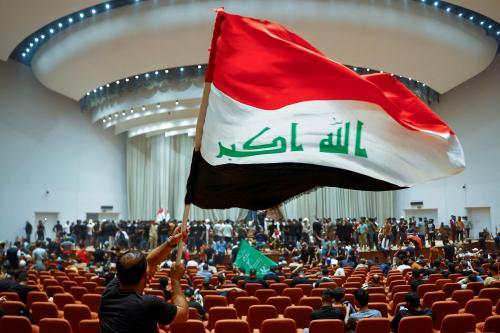Content from the Brookings Doha Center is now archived. In September 2021, after 14 years of impactful partnership, Brookings and the Brookings Doha Center announced that they were ending their affiliation. The Brookings Doha Center is now the Middle East Council on Global Affairs, a separate public policy institution based in Qatar.
U.S. relations with its long-standing, historical ally the Kurdistan Regional Government (KRG) took a hit this month when Iraq’s security forces and the Shiite militias of the Popular Mobilization Force (PMF) launched an offensive against the Peshmerga in the disputed territory of Kirkuk, with U.S. acquiescence. Washington’s tacit support for the offensive stemmed from its policy of upending Iran-aligned factions in Iraq in the forthcoming parliamentary elections, namely by empowering Iraq’s so-called moderate prime minister, Haidar al-Abadi. The idea, as it currently stands in Washington, is that the stronger Abadi looks to the electorate, the greater his chances of winning forthcoming elections.
But the elections are a long, volatile, and unpredictable six months away, and it may already be too late to sideline the Iran-aligned factions that dominate the PMF. Those groups are lionized by broad sections of the Shiite community, experiencing a meteoric rise following their role in the war on ISIS. Abadi, who came into office only three years ago without a popular and political base, cannot singlehandedly stop their ascendancy.
Enter the Kurds and Iraq’s Arab Sunnis. Since 2003, no government has been formed without the Kurds, who have generally enjoyed the role of kingmaker as a consequence of the diffuse nature of power and politics in Baghdad and the confessional power-sharing arrangements. Ensuring the Kurds continue engaging with Baghdad and have a stake in the Iraqi state will be central to U.S. interests in Iraq: Absent Kurdish engagement to bolster al-Abadi’s position, hardline Iran-aligned factions will almost certainly dominate the government and consolidate their hold on state institutions.
Ensuring the Kurds continue engaging with Baghdad and have a stake in the Iraqi state will be central to U.S. interests in Iraq.
Amid the tumult of the Kirkuk offensive and the frenzy around the Kurdish independence referendum last month, what has been remarkably absent from the discussion—and from U.S. engagements in Iraq—is Iraq’s Arab Sunnis and their future. ISIS was born from the failures of governance and authority in the north. The marginalization of the Arab Sunni community, indiscriminate and disproportional anti-terror raids and arrests in Arab Sunni communities, and the lack of jobs and services provided an environment that was conducive to ISIS’s emergence in 2014, alongside the sectarian rule of former-prime minister, Nouri al-Maliki.
Two competing orders that have shaped conflict and bloodshed in Iraq still remain very much in play: On the one hand, Iraq’s Arab Shiite factions have instrumentalised the repressive rule of the Baath Party as a source of legitimacy, allowing them to position themselves as the liberators of the country and the guarantors of the post-2003 political order. Their identity and existence is based around narratives of victimhood and the notion of preventing a Baathist resurrection that would return the country to repressive rule. This narrative has provided Shiite Islamist parties and militias with the resources and capacity to mobilize cross-sections of the Shiite population.
Conversely, for Arab Sunni actors—ranging from political parties, to tribes, insurgent groups, and jihadis—the pre-2003 period is invoked to evoke memories of an era of Arab glory, free of militia rule, sectarian discord, and Safavid (Iranian) as well as Western imperialism. The latter narrative has enabled ISIS and its previous incarnations to swell their ranks and commit violent atrocities.
Kurdish statehood has been a long-standing, historical feature of Iraq’s political history that does not necessarily determine the fate and legitimacy of the Iraqi state, even if it is disruptive and divisive. But failure to acquire the buy-in of Arab Sunnis will continue the two competing political orders that has resulted in hundreds of thousands of deaths, sectarian bloodshed and proxy warfare between competing regional powers.
Iraq does not necessarily have a sectarian problem but a governance problem.
Iraq does not necessarily have a sectarian problem but a governance problem; its ruling Shiite political class lacks vision and capacity to move the country forward. Baghdad’s failures and the uncertainty of Iraq’s future have even led Iraq’s Arab Sunnis—once vehemently opposed to any weakening of the central government—to call for their own autonomous region akin to Kurdistan, one that allows them to manage their own security and resources within a federal Iraq.
The commentary on Kurdish independence has distorted the picture somewhat. The underlying problem that actually lies at the heart of the current conflict between the KRG and Baghdad— and between Baghdad’s Shiite political class and the country’s Arab Sunnis—is power-sharing. It is only through equitable, just, and sustained power-sharing arrangements firmly entrenched within Iraq’s political system that conflict can be remedied and the Iraqi state can recover from its crisis of authority and legitimacy.
The United States can learn from past and recent mistakes: Fair and credible power sharing could have obviated the need for the independence referendum, but after events in Kirkuk, the United States now risks allowing Baghdad to exploit the momentum generated by the Kirkuk intervention and abuse America’s willingness to give it the benefit of the doubt. Shiite militias and Iraqi security forces have moved against the Peshmerga to try and take control of Faysh-Khabur, strategically vital because oil from both Kurdistan and Baghdad-held parts of northern Iraq cross at a pipeline there into Turkey, the main route out of the area for international exports.
By controlling the border with Turkey, Baghdad could encircle Erbil and economically suffocate the KRG. However, the United States must prevent Baghdad from doing so to ensure that further advances do not result in implosion and a full-scale civil war that will almost certainly ensue if the Kurds believe their backs are to the wall.
Similarly, Washington failed to stand by the factions and fighters of the “Awakening Movement” project—a coalition of Sunni tribes and other actors that America backed between 2006 and 2008 to maintain security in local areas and combat al-Qaida in Iraq, in return for their integration into the state. Iraq’s Arab Sunni-dominated heartlands in the north saw prolonged periods of stability, only for Iraq’s Shiite political class to then renege on its terms and breed grievances that were then central to ISIS’s emergence.
A decentralized Iraq that affords greater powers to communities and local actors could help enable the breathing room that allows the state and society to undergo a process of rehabilitation. The international community can adopt a dual-track policy aimed at strengthening local sub-state governance (through, for example, focusing on transitional justice and reconciliation, as well as by devolving reconstruction and development funds) but that also aims to strengthen institutions at the federal level.
The fragility of the Iraqi state and questions surrounding its legitimacy, along with sectarian conflict, will continue unless the United States asserts and re-calibrates its policies toward power-sharing arrangements. Those will constrain the space for violent and disorderly actors, including the Iran-aligned groups Washington seeks to sideline.










Commentary
To save Iraq, Washington must push for fair and credible power-sharing
October 27, 2017